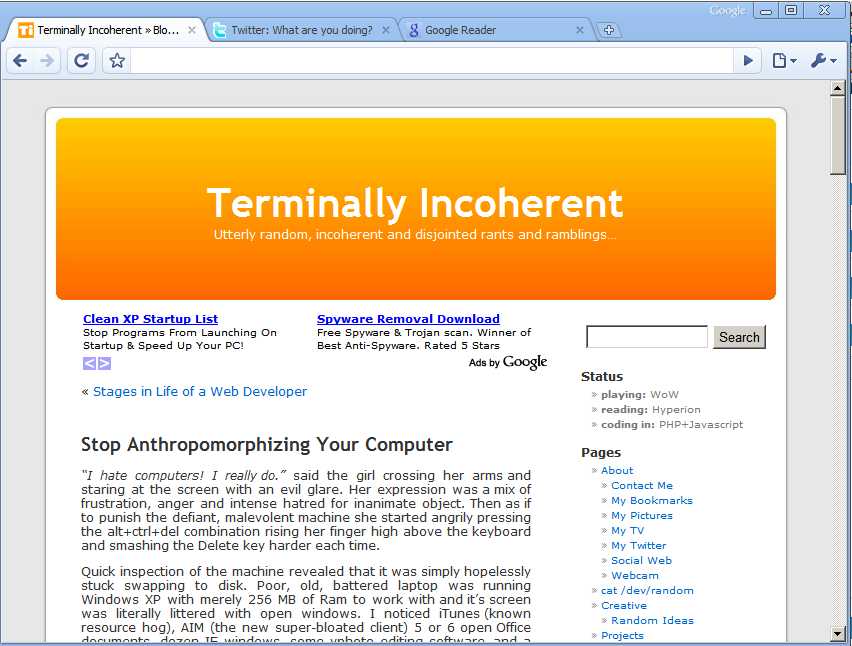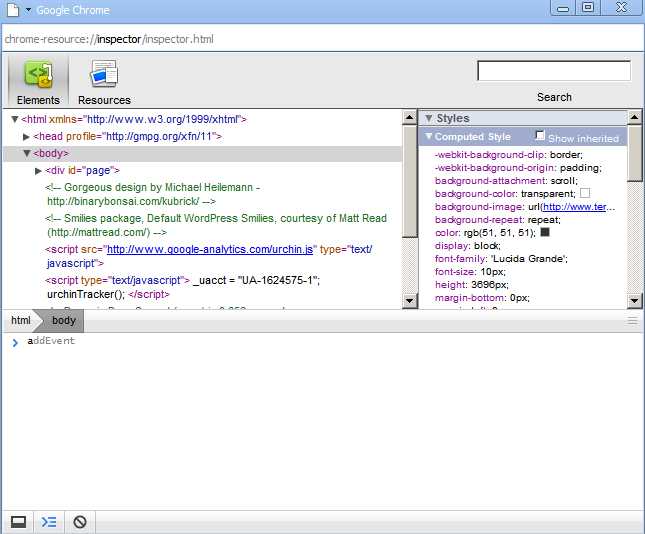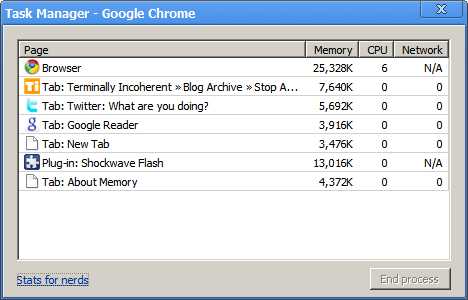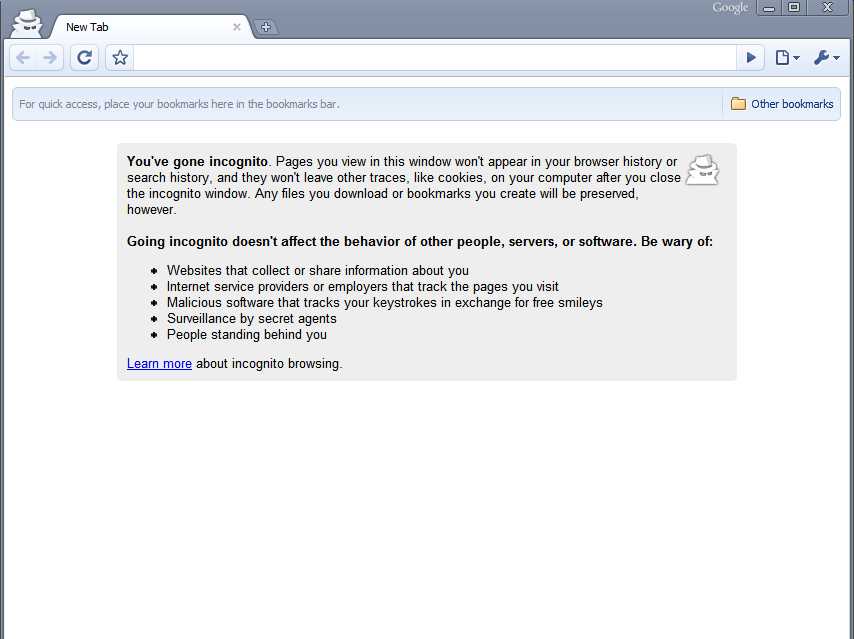Ok, by the show of hands, who has predicted that today’s post will be about Google Chrome? Seriously, I’m getting predictable here but I couldn’t resist picking it up and messing around with it shortly after it was released. My attitude about it was mixed. On one hand, I was excited to see yet another desktop application from Google. So far everything they touched was pure gold from the interface design perspective. I was curious to see how will they tackle a browser UI and will their creation do the same thing that Google Talk did to IM interface design.
The other side of me was a little bit upset. What about Firefox? Does it mean that my favorite browser won’t get any more Google love? I was a bit upset to see Google brewing up a product which would be in direct competition with Mozilla’s flagship product. Whether or not will this new browser become a real threat to Firefox remains to be seen, but Mozilla intends to keep a friendly relationship with Google and if nothing else they seem energized by this new contender entering the web browser market.
Chrome ships as a one-click installer and when they say one-click they mean one-click. It’s as if someone at Google read Jeff Atwood’s rant about complex installation procedures. All you actually need to do is to accept the EULA but you do that on the download page before actually running the installer. Once you accept it, there are no further questions asked. The browser is downloaded and installed for you. The age old question of “where do you want to install this software” is skipped, which is probably a good thing considering the fact that most lusers completely bypass the file system.
Once the browser launches you can immediately see that it is a Google product. It has the same trademark sleek, minimalistic look and feel as Google Talk. The look they were aiming at is something between IE7/8 and Opera but much simpler. It is light on buttons and menus keeping them to bare bones minimum. Google’s UI design principle seems to be less is more and it works. Microsoft tried to follow a similar paradigm with the simplified IE7 and 8 toolbars but it was a half assed attempt. Google designers took a typical browser UI and kept ripping things out until there was nothing left. It was a bold move but it pays off because Chrome looks at least twice as easy to use as Firefox or IE. Casual user is not bothered by cryptic menus or unnecessary icons while power users can still get to some of the more advanced browser features at will.
Personally, I like the placement of the tab bar over the address bar. I’m not sure why, but it seems like a good move. It creates a stronger visual association between the tab and the URL. In other browsers you switch tabs, and the address bar mysteriously follows. In Chrome switching tabs is like flipping pages, each of which has their own address box. This is one of these nifty features that won’t confuse anyone already familiar with tabbed browsing, but may actually help to teach new users about it. I know many IE7 users who still do not understand tabbing. Google Chrome UI may actually be more visually accessible.
I noticed that there is no “undo close tab” context option when right clicking on the tabs. I can’t tell you how often i use that feature in FF and it seems indispensable. I was about to complain about lack of this feature but I found it on the Opera like speed dial page which you see each time you open up a new tab. It combines the speed dial feature with web history, list of recently closed tabs (which you can use to restore what you just closed), list of your bookmarks and a search box.
The address bar itself is almost on par with the FF3 smart bar – it does the same smart lookup as you type thing. In addition it grays out all the parts of your URL which are not the domain name which is a nice touch. It also uses the well established convention of turning yellow for valid SSL connections. Similarly to FF3 Chrome produces a disturbing full page error message when you hit a page with an invalid SSL certificate – this behavior is quickly becoming standard these days. One thing that I hate about the address bar is the absence of favicons. It is almost criminal not to display them this day and age but alas – Chrome put the bookmark button where the favicon ought to be. At least the icons show up on your bookmark bar/page so not all is lost.
Continuing with the minimalistic theme the address bar doubles up as a search bar and can preface search engine queries with a ? to distinguish them from regular URL’s. Furthermore I noticed that all the common navigational shortcuts you know and love from Firefox work in the Google browser without a hitch. You can use Ctrl+T for new tab, Ctrl+W to close current tab, Ctrl+L for address bar, Ctrl+K for web search, Ctrl+G advances incremental search to the next match. This is perfect. Every time I switch from Firefox to Opera I feel like I’m half retarded because half the shortcuts are different. This is not the case with Chrome. IE users won’t be disappointed either because IE specific key strokes such as Alt+D also work in predictable ways.
I absolutely love the incremental search which puts colored notches on the scroll bar to indicate where in text match is located in the body of the page. This brilliant because it lets you evaluate at a glance how many matches are on the page, and gives you an idea of where you are in relation to other matching items! We need this in Firefox like tomorrow. I’m not sure if this is a WebKit thing, or a Google invention but it is awesome. I don’t recall seeing it anywhere else so I assume it’s Google’s but correct me if I’m wrong.
Chrome’s Javascript console simply blew me away. At the first glance it really looks like a Firebug clone but built into the browser. I haven’t had a chance to actually play with it or use it for actual debugging but it is very impressive. I really didn’t expect to see something like this in this browser which is yet another one of Google trademark tricks – a simple, minimalistic and sleek interior hides internal complexity and a lot of raw power. This browser may actually be a pretty handy tool for web designers in addition to being a great beginner browser to tech neophytes.
Sessions in this browser are naturally present (only IE doesn’t do sessions) but they are vastly inferior to Firefox sessions. For example, Chrome won’t preserve the text you typed into a text box after you close your browser window the way Firefox will. It also won’t restore your exact position on the page you were reading. When Chrome restores your session it simply reloads the URL’s – it does not restore them with their exact states from a cashed snapshot. Perhaps this is a webkit shortcoming – I’m not sure.
The internal features of Chrome are quite impressive. For example each tab is pretty much a self contained instance of the browser. Webpages run in separate sandboxes and there is no way for one of them to take over or crash your whole browser. Great feature but one must wonder how will that impact memory usage after many hours of browsing. Chrome gives you tools to track it’s own memory usage and the overhead didn’t seem that huge. Browser seems much leaner than Firefox in general, which is not actually a huge accomplishment.
What is more interesting is that you can now accurately identify what exactly is causing your browser to use so much memory. When Firefox bloats up and takes over half of your RAM you are forced to guess what is happening. Is it one of those infamous memory leaks? Is it one of the scripts running in a background tab that continues allocating memory? Is it something else? Chrome shifts the blame for memory bloat from the browser to the page creator which is an interesting development. Instead of saying “Firefox is a resource hog” you can now say for example “Youtube is a resource hog” instead.
You can detach any tab and turn it into Mozilla Prism like desktop application complete with desktop shortcuts. You can basically have your dedicated Gmail window which opens from Desktop or Quick Launch. I never really used Prism, and I don’t really see myself extensively using this particular feature of Chrome but I can see it’s usefulness.
Without a doubt the most innovative feature of this browser is the porn browsing mode… Um… Sorry, the Incognito Mode which launches a new instance of the browser which does not permanently store any cookies, cache or web history on your machine. Perfect for browsing teh porns. I have never seen the issue of privacy handled this way before. All existing browsers force users to clean up after they browse. Not only that, but they insist on an all-or-nothing approach. You either delete all your cookies, all history or all cache or none of it. There is no easy way to delete just the embarrassing stuff other than manually sifting through the web history or the cache folder. Chrome simply launches a new instance of the browser which is actually visually distinct from the regular non-incognito window and lets you browse embarrassing stuff without worrying about cleanup:
It’s a proactive rather than retroactive approach to privacy and one that can be accomplished with a single click of a button. It’s click, browse then forget rather than browse and then forget to clean up. I really hope this feature will catch on because this is a huge leap in making regular users in charge of their own privacy. I want it in Firefox but I’m not sure it if is possible to implement it seeing how the Mozilla browser will only let you run a single instance of itself ever.
Chrome did not disappoint me. Google took several existing ideas, mixed them with their own innovations and created a browser that not only looks pretty but is potentially more user friendly than anything that I have seen before. I’m not sure if it will ever catch on and become as popular as Firefox but it does have many features that I would love to see implemented in the mainstream browsers: namely the incognito mode, the Prism like desktop app detachment, the nifty textual search indicators on the scroll bars and the sandboxing model.
I’m sticking with Firefox. It has served me well for many years and it keeps improving. Besides, I’d be lost without my extensions which pretty much make the browser. But I’m keeping Chrome around so that I can continue messing around with it which is more than what I can say for most other browsers.
Few words on the speed. Chrome seems to start faster than Firefox, but renders pages a bit slower than Gecko which is pretty much what I expected. I didn’t time it, I just eyeballed it so your millage may differ. The V8 javascript actually does make a difference. I tested it on my infamous script that makes browsers go slow by dumping lots of data into a HTML table and then applying the jQuery TableSorter plugin to it. First load was almost as slow as Firefox. Subsequent loads, are almost instantaneous while Firefox still takes few seconds to run the sorter script. I don’t know, maybe I’m seeing things but I can really notice a difference.
Between TraceMonkey and V8 it looks like this is going to be a good year for speeding up Javascript. Oh and V8 is under a BSD license it seems. Nice!




I tried it out and liked it…but I am actually steering clear of any Google “product” that install services without my expressed consent (in fact, ANY product, by Google, Apple, and/or Adobe). Googleupdate.exe starts up automatically and even if I uninstall the Google product (not sure if it came with Sketchup or Chrome) the damned updater remains in my Task List. I actually had to physically delete the Google directory (under local applications no less).
I predicted the topic, but that doesn’t mean I didn’t like your take on it. Excellent analysis & detail. I’ve just played with it some, and felt similarly.
There are two add-ons that I really miss. Adblock and Greasemonkey. Every browser I use regularly has some type of opporbunity to change webpages on the fly. Kazehakase uses ruby, most gecko browsers support GM.
Without these extensions, chrome will probably end up being a browser I just leave open on gmail & google reader, but not where I do my heavy browsing. But more competition is always good.
Heh, I generally try not to predict the future, but… let’s just say I wasn’t surprised to find this post ;)
I just heard about Chrome the other day, but I haven’t actually tried it yet. Nor will I. Not that I don’t like it, it seems really great, but unless it magically gains the ability to load Firefox extensions or at least gets the functionality of my favorite extensions (most importantly Adblock and Ubiquity [which is really cool, btw!]), I won’t be using it.
I also share your concern about it kinda challenging Firefox, but maybe that doesn’t really matter. I mean, if it turns out better than Firefox, I wouldn’t want people to use Firefox just because it’s…Firefox. (does this make any sense?)
Btw, I’m pretty sure IE8 has a porn mode aswell. Which is why I actually said out loud “Oh, Chrome has a porn mode too” when watching one of the official Google videos about Chrome :P
Well, I was close. I predicted that today’s topic would be about how your WoWoW character uses Chrome to check out the census database and determine where the nearest all-volunteer, all-male enemy camp is for raiding and how, at the end of the day, the server file storage failed and had to be restored from a backup so your character had to go through the exact same day again and…
Safari also has a private browsing feature, but I have never actually used it, so I’m not sure how similar the two browsers’ versions are.
It sounds like Google did a great job, which is no surprise. I wonder how Microsoft is feeling these days….
I agree – until Chrome has Adblock and Greasemonkey I will stick with Firefox. :)
Also, I do not expect it to gain lot’s of ground immediately as evidenced by my conversation with my brother:
Me: “Did you hear Google released a browser?”
Him: “I thought Google was a browser…”
Me: “You mean a search engine”
Him: “Yea… Wait, so what’s a browser?”
Me: *banging head against the desk*
Seems that Chrome is lacking an RSS feedreader.
Nope, but I do not consider that an essential browser functionality. Firefox doesn’t have one for example (you can get and extension though that is a feed reader though).
Also, Google already offers a feed reader – you know, the Google Reader. You can make Chrome into a dedicated desktop feed reader by:
1. Going to reader.google.com
2. Clicking on “create application shortcuts”
3. Watching it turn into a desktop like application
Chrome already has Gears plugin which means you will be able to read your feeds offline (for example on a plane) just as if it was a dedicated RSS desktop client.
Adblock is a must.
About gaining ground, though google says the objective is IE, I think lots of IE users are like your brother, and are non IE users who are evaluating chrome.
Actually, my brother is using Firefox. I pretty much forced him to try it, and initially he was whining that he saw no difference between FF and IE but somehow he never reverted back. :)
Same goes for my coworkers and immediate family. They all use “Fox Fire” (as they stubbornly call it) now and like it. The tabbing, sessions and the built in spell-checker are amongst their favorite features.
But when I mentioned Google Browser the other day I saw the usual expression that pretty much says:
“Oh no, here he goes again with the geek stuff, I’m just gonna pretend I’m listening to be polite and hum a little song in my head to drown out the noise… I kissed a girl and I liked it… da da da di di dam dam… something something something something…. da da da cherry chopstick…”
So yeah, the Chrome hype exists only in the geek circles. Regular people don’t have the faintest clue what the hell are we all getting so excited about.
Since no one posted a comment from chrome in this thread yet I’m gonna do it now. Let’s see if the browser detection plugin detects it.
LOL! Chrome detects as Safari on OSX. I guess I’ll have to update the plugin again. :)
http://en.wikinews.org/wiki/Google_removes_ownership_claim_from_Chrome _EULA
This is what kept me from checking the software out.
Yeah, I saw that the other day but wouldn’t stop me from testing the thing. This is yet another example that no one actually reads EULA’s – not even the people who put them in their software, or the QA people who are supposed to catch shit like that during testing and reviews.
Oh well, at least they removed it and apologized. I mean, it’s not like they need to own your content – they just need to index it. I wonder whether or not we will find some secret spy module in that browser one day that reports your browsing habits back to the lords of search. :P
Google Chrome is really fast!
Now I can sort 200,000 records inside of Browser (Chrome) just in 1 sec. (Faster than Microsoft Excel):
http://www.ardentedge.com/ex_if.htm
@George Toms: Yup, it is pretty fast. The new TraceMonkey engine from Mozilla is comparable but V8 wins on recursion at the moment because TraceMonkey does not optimize for it.
Chrome seems like the ideal mobile browser as far as the UI. If it ever gets ported to Linux, I hope it also gets ported to Maemo (my N800!). But even then, MicroB on the N800 supports Adblock Plus and Greasemonkey, which Chrome is missing.
Same comment from me than for most people. I didn’t try it because it is not on Linux or Win2K (the only OS I use). I will probably install it on my gf Win XP computer, just to see if it is faster than FF3. The rational being that she has memory usage issues and that she is bad at tab browsing. The position of the address field in Chrome might help her a bit.
I might use it myself if and only if they have a Linux version which supports Firefox extensions or similar ones (FoxMarks being the absolute necessity for me).
Just a side note, thanks to the open nature of chrome, someone has already released a beta version of GM for chrome, called “greasemetal.” And you can block ads with privoxy, though it isn’t as good as adblock plus. So chrome isn’t replacing FF for me any time soon, but we’re getting there…
“Undo close tab” works with “Ctrl+Shift-t”, the same as in FF
@jambarama: Nice find! I will need to check out greasemetal. :)
@dpgodct.od: Yeah, I was just saying the option is missing from the tab right click context menu. The feature is indeed supported by the browser.